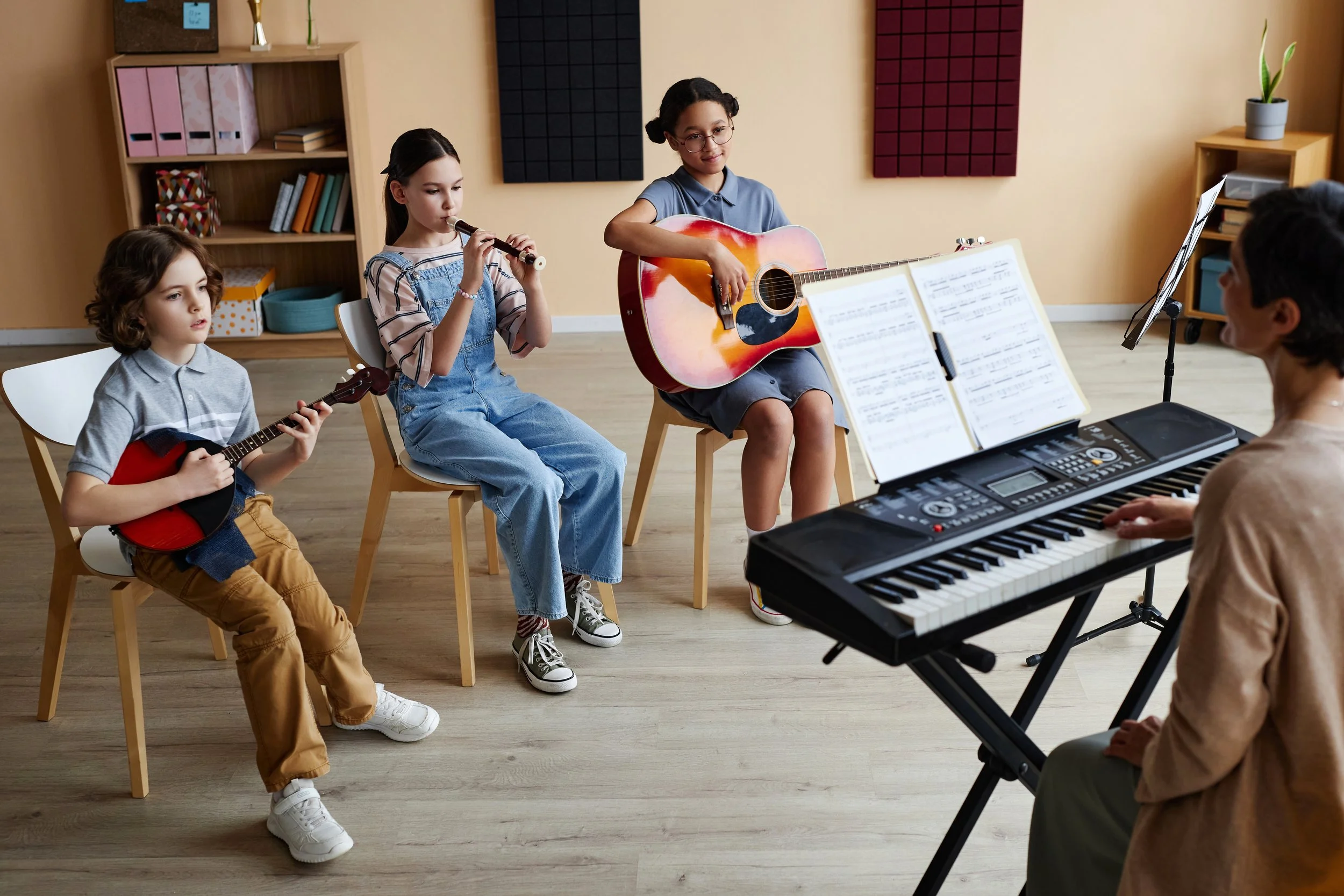5 benefits of musical education
Today, extracurricular activities are an essential part of people’s upbringing, especially in supporting the holistic development of primary school-aged kids. Among the plethora of activities available, pursuing a musical education stands out for its diverse benefits that improve the lives of our youth.
Music education for children is often celebrated for its artistic value. However, its benefits extend far beyond artistic growth, significantly contributing to emotional, social, and cognitive development, helping children become well-rounded individuals. In this article, we’ll delve into the numerous advantages of music education for children and discuss how young learners can thrive by learning to play an instrument.
From enhancing social skills to cultivating self-worth and discipline, the impact of musical education is profound and far-reaching. Young musicians often exhibit stronger memory, heightened emotional understanding, and improved cognitive performance. As you will discover, learning music enriches your child's life in many ways beyond simply mastering an instrument!
Benefit #1: Boosted Social Skills and Communication
Playing music inherently fosters emotional expression and enhances communication skills, allowing children to understand and convey complex emotions, thoughts, and moods more effectively. As young learners engage with music, they are introduced to a medium that transcends verbal language and encourages them to creatively explore and articulate their feelings. This process of emotional expression through music facilitates better self-awareness and empathy, crucial components of effective communication.
Furthermore, music provides a supportive environment for social interactions, which is critical to a child's social development. In group settings, such as band or choir, children collaborate, listen to one another, and develop mutual respect. These interactions help them build beneficial peer relationships and cultivate socially appropriate behaviors, as researchers Kuimova and Semchin found. By learning to work together towards a common goal, children refine their social skills and understand the value of teamwork and cooperation, which are essential life skills.
Benefit #2: Improved Self-Worth and Discipline
Music education also plays a pivotal role in building self-confidence, patience, and discipline among children. Learning to master an instrument requires consistent dedication and persistence, inherently fostering a sense of perseverance and willpower. As kids gradually achieve musical milestones, such as playing a new piece or perfecting a difficult scale, they experience tangible rewards for their efforts. This continuous cycle of practice and improvement cultivates patience and determination, which are beneficial throughout life.
Moreover, pursuing music nurtures a profound sense of self-worth and accomplishment. Each new skill or piece mastered contributes to a child's confidence, reinforcing their belief in their abilities. This process encourages children to approach challenges with focused determination and resilience. By overcoming obstacles and celebrating their musical achievements, children learn to confront difficulties both in and beyond the realm of music, empowered by their growing sense of accomplishment and self-worth.
Benefit #3: Memory Enhancement
Another benefit is that music education significantly strengthens various types of memory, including auditory, visual, motor, imagery, and associative memory, all of which are essential for academic success and cognitive development. Through learning and practicing music, children engage multiple memory systems simultaneously, enhancing their ability to retain and recall information. This multidimensional stimulation benefits their musical skills and improves performance in other academic areas.
Teachers reported that children involved in music education showed an impressive 86% improvement in memory. This remarkable enhancement underscores the profound impact that musical training can have on a child's cognitive development. Children develop strong memory skills that support their overall learning and intellectual growth by engaging in music. As they progress in their musical journey, the continuous exercise of these memory types fosters an environment where cognitive abilities are continually being refined and expanded.
Benefit #4: Greater Emotional Understanding and Expression
Furthermore, children engaged in music education often exhibit heightened emotional awareness and sensitivity. Through the study of music, they learn how to easily recognize and express their own feelings and understand the emotions of others. This enhanced emotional intelligence is fostered by the interpretive nature of musical performance and the empathetic connections formed within musical settings.
Furthermore, music provides children with constructive outlets for emotional expression. Engaging with music allows them to channel their emotions creatively, fostering emotional resilience and contributing to overall mental well-being. These expressive skills are invaluable, enabling children to navigate their emotional landscapes confidently.
According to research on the effects of music, children who participate in music education have better tools for emotional regulation and expression, ultimately supporting their mental health and emotional growth. Children develop a balanced approach to emotional understanding and expression through music, preparing them for a well-rounded future.
Benefit #5: A Positive Future Outlook
Finally, early music training profoundly impacts students' future outlook, fostering optimism and positive youth development. According to a study, younger students who began music training early exhibited stronger self-confidence and a higher sense of capability. These young musicians scored higher on measures of positive youth development, highlighting music education's significant role in shaping a hopeful perspective on life.
Additionally, these students demonstrated reduced engagement in risky behaviors, indicative of better long-term prospects. The discipline and dedication required in music training contribute to a more structured and purposeful approach to their future.
By nurturing these essential life skills, music education equips children with the tools they need for ongoing personal and professional success. This holistic development instills a solid sense of self-worth and prepares them to face challenges confidently and confidently, ensuring a bright and promising future.
Provide Your Child with the Benefits of a Musical Education Today
The benefits of musical education are vast and transformative for children, extending well beyond the joy of playing an instrument. From enhanced social skills, improved self-worth, and discipline to memory enhancement, emotional intelligence, and a positive future outlook, music wields the power to shape young minds profoundly.
These invaluable benefits are available to your children, too, by exploring the various exceptional music schools in Vancouver. Contact our musical school today to enrich your child’s life with the gift of music and watch them thrive in unexpected and beautiful ways.



